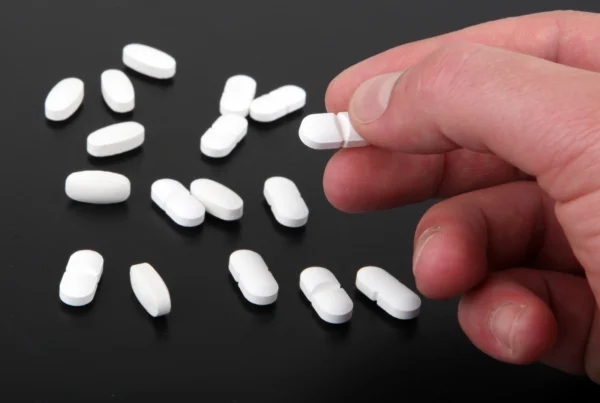
Table of Contents
Key Points
- Acid is a psychoactive drug that causes physical and mental sensations to occur.
- Acid trips can last up to 15 hours and can take 24 hours for all effects to completely subside.
- Many effects of acid can be felt within 20 minutes of taking the dose.
- There are known negative short and long-term effects of taking acid.
- Acid can show up in a variety of different drug tests.
Acid is a common name for Lysergic Acid Diethylamide (LSD). It is a strong, long-lasting psychoactive drug that comes from a fungus, ergot, that produces on grains such as rye. Acid was first synthesized by Albert Hofmann[1], a chemist that worked on organic products at Sandoz AG pharmaceutical company in Basel, Switzerland, in 1938.
When consumed, the acid causes a variety of effects on the body and mind, including mood changes and hallucinations. It is often measured in ‘tabs’ or ‘hits.’
The effects of acid last depending on how potent the dose is, your body and size, and if you are on any other medications. The effects last about 6 to 15 hours.
There is a Better Way to Live. Its Time to Get the Help You Deserve.
Contact UsWhy Does Acid Last So Long?
When acid is taken, the molecules will adhere to the serotonin receptors in the brain, which causes the psychedelic effects. These acid molecules will then be trapped within the receptor by amino acids.
When the acid molecules are knocked free from the serotonin receptors, or they fall off, the effects of the drug will begin to fade. The process has to take place in order for the acid molecules to disappear from the receptors.
While some acid trips can last up to 15 hours, most won’t last past 12 hours. Following the trip, there may be an “afterglow” effect that can last an additional six hours. This will cause your body to take up to 24 hours to return to a normal state.
What Are The Immediate Effects Of Acid?
Effects from taking acid can usually be felt within 20 minutes to two hours. This depends on how much is taken and how potent the dose is, your health, size, and body, and whether other substances are being used concurrently.
The effects of acid will be noticed both physically and mentally. If someone is suffering from anxiety or is not in the right frame of mind before taking the drug, a bad trip may be experienced.
How Acid Affects Your Body
There are some physical effects of acid that can be noticed when the trip begins. These feelings should go away within 24 hours of taking the drug.
- Increased heart rate
- Dilated pupils
- Dry mouth
- Higher blood pressure
- Nausea or vomiting
- Warmer body temperature
- Headaches
- Insomnia
- Shakiness
How Acid Affects Your Brain
Acid has many effects on the mind during an acid trip. It can create a sense of euphoria and cause you to feel more relaxed, content, or happy.
It can also create anxiety or panic if you begin to have a bad trip. Your surroundings and mood before you take it will make a difference in how the trip goes.
The acid will also increase your senses when its effects are in full force. Most of the time, these are noticed through visual stimuli, such as:
- Hallucinations
- Bright or “noisy” colors
- Trails running behind objects
- Changing shapes
- Unusual patterns
Long-Term Effects Of Acid
Long-term effects of acid can be caused by dramatic brain chemistry changes. These effects may persist for years or clear up much faster.
Hallucinogen-persisting perception disorder (HPPD) is one long-term effect of acid that may occur. This is commonly known as having flashbacks. It is where the user will re-experience the sensations of a prior trip. This can be present for as long as 5 years.[2]
For individuals that take prescription psychiatric medications, serotonin syndrome may occur. Serotonin syndrome includes symptoms of:
- Nausea or vomiting
- High body temperature or fever
- Hallucinations
- Diarrhea
- Agitation or restlessness
- Rapid or irregular heartbeat
- Seizures
- Fast changes in blood pressure
- Loss of coordination
Acid won’t cause psychosis on its own, but for individuals who are predisposed to psychosis, drug-induced psychosis may be more likely.
How Long Is Acid Detectable In Your System?
How long acid is detectable in your system depends on various factors. Acid is normally taken in small doses, which will make it harder to locate in your system. It also metabolizes faster in your body, which can affect how well drug tests can pick it up.
How Long Acid Is Detectable In Urine
Acid can be found in the urine for 2- 4 days in most cases. However, most traditional drug tests won’t be able to detect acid.[3] In the majority of urine tests that come back positive for acid, the metabolite, 2-oxo 3-hydroxy- LSD, is higher than that of the acid itself.[4]
How Long Acid Is Detectable In Blood
The time frame that acid is detectable in blood is much shorter than for urine. It is estimated to stay in the blood for 6 – 12 hours.[4] This gives a much shorter amount of time for this kind of test to be used to detect the presence of acid.
How Long Acid Is Detectable In Hair
In some cases, a hair test will be used to look for acid in the system. Acid can remain in a hair follicle for up to 90 days.
Risks Of Using Acid
It is difficult to know exactly how much acid is in each dose. Although the effects of acid may seem like only positive feelings, there can be negative effects as well.
Adverse Reactions
A “bad trip” can happen when you take acid. This may cause you to have terrifying hallucinations, distraught feelings, and anxiety. Experiencing a bad trip can last just as long as a good trip, and there is nothing that can be done to stop it once it begins.
Flashbacks
HPPD can last for months and even years after taking acid. It will cause flashbacks of the trip experience, which can cause you feelings of unease. Treatment may help ease this effect.
Legal Troubles
Acid was declared an illegal, controlled substance by the U.S. state and federal government in the 1960s. If you are caught with acid, there is a very high chance that you can face prison time, fines, or probation.
Psychotic Issues
If someone has a history of psychosis or schizophrenia, acid may trigger a psychosis episode. This is considered the acute or crisis stage of the 5 stages of psychosis.. It is very important to learn of any genetic problems prior to trying acid. Drug-induced psychosis will need to be treated in a facility that has the means to handle the situation. Psychosis can make an individual a danger to themselves or others.
Tolerance
Acid tolerance can occur quickly when doses are increased or large for each trip. This can result in needing more to achieve the same effects.
Treatment For Acid Use
Users may become psychologically addicted to using acid. However, this is usually not a physically addicting drug. When someone becomes addicted to the mental effects of acid, they will overuse the drug.
Through different types of therapy, someone who has a psychological addiction to acid may be able to stop craving the effects of the drug. These kinds of therapies include cognitive behavioral therapy, dialectical behavioral therapy, and lifestyle skills therapy.
Ocean Recovery can help you or a loved one get back on a path where you’re not controlled by the effects of acid. We specialize in therapeutic approaches to addictions. In our addiction programs, you can find a program that fits your needs.
The different care programs we offer include:
- One-On-One Case Management
- Group Therapy
- Nutritional Counseling (Women’s Program)
- Eye Movement Desensitization and Reprocessing (EMDR)
- Family Counseling
- One-On-One Psychiatric Care
- Experiential Therapy
- Surf Therapy (Men’s Program)
- Somatic Experiencing (Women’s Program)
Frequently Asked Questions About Acid
Below are some of the most frequently asked questions regarding LSD/Acid
OCEAN RECOVERY EDITORIAL GUIDELINES
The internet contains a vast amount of misinformation, but when it comes to your health only peer reviewed, research centered data matters. At Ocean Recovery, all content published throughout our website has been rigorously medically reviewed by a doctorate level clinician, and cross checked for medical accuracy. Our editorial process helps our readers trust that the information they are consuming is factual and based upon scientific data. Your health is our top priority, find out more about how we safeguard the integrity of information on our website. Read More About Our Process





